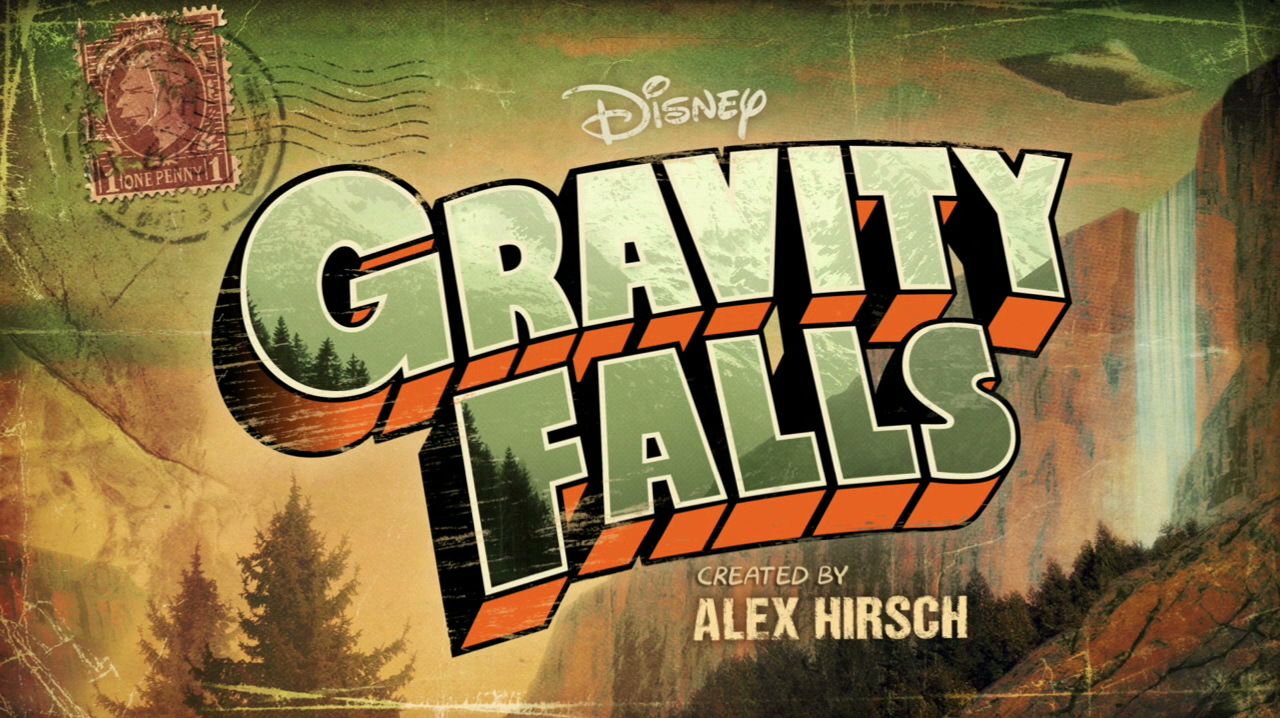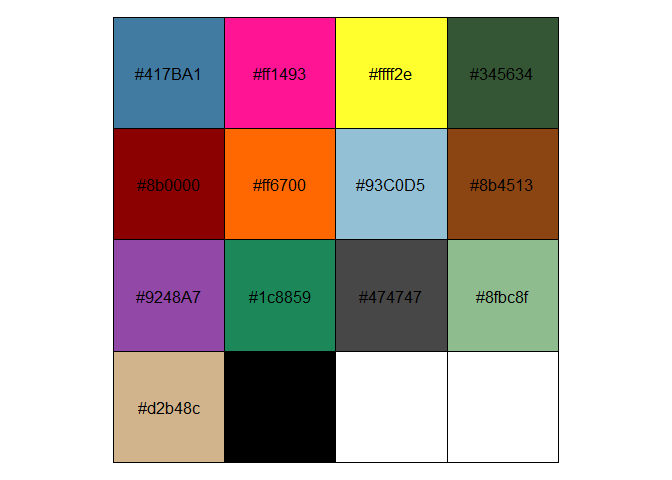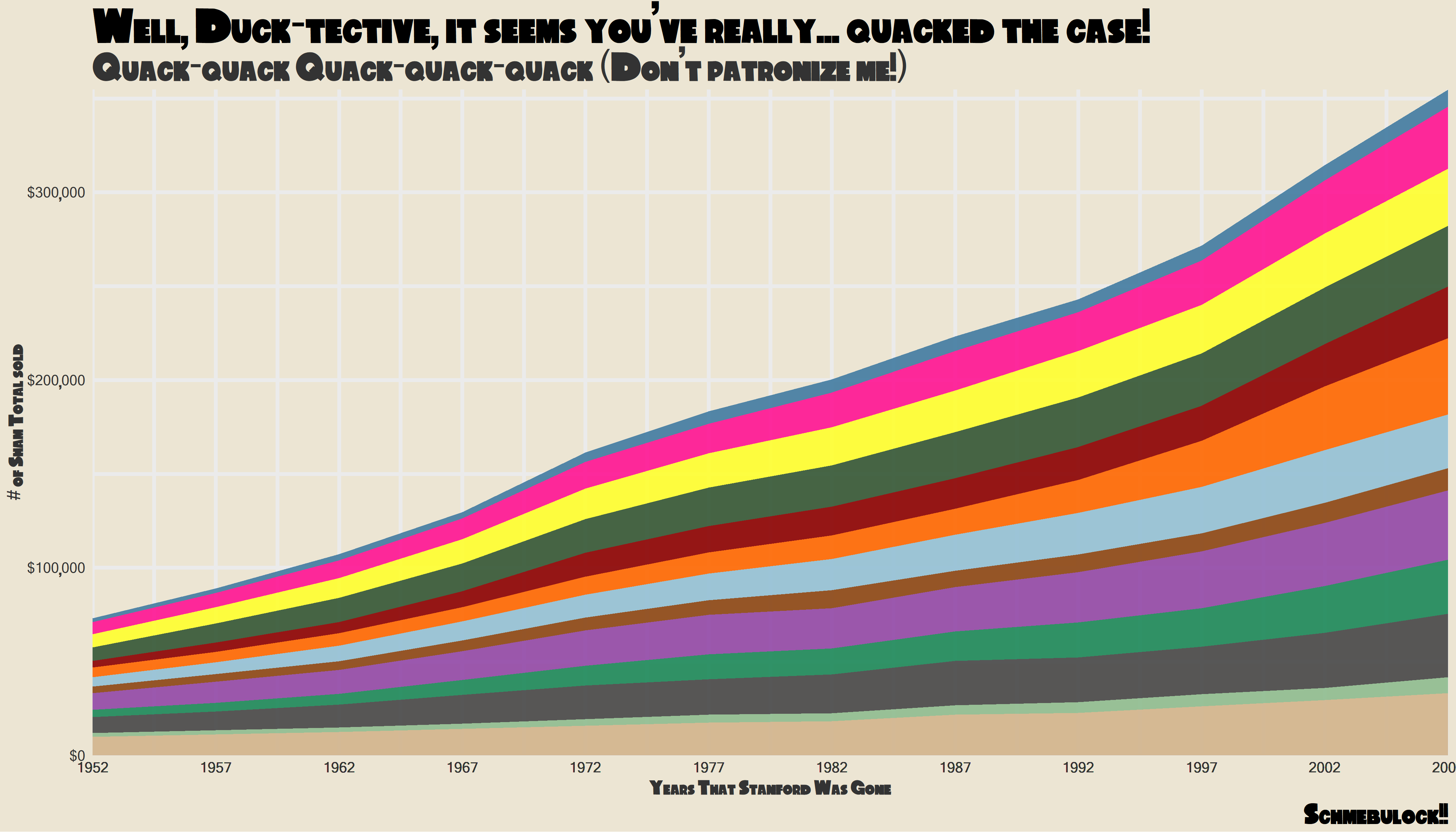The newest version of {tvthemes} is now on CRAN! v1.1.0 features one new palette (Gravity Falls), vignettes, renamed functions, and a nice pkgdown website.
install.packages("tvthemes") # v1.1.0
library(tvthemes)
Gravity Falls
Let’s start off with the main item of interest, the “Gravity Falls” palette.

I’ve been meaning to watch Gravity Falls for a while now and once I started I couldn’t stop, it was so much fun! After pretty much binging the show within a week (and reading the extra comic book) I knew I had to make a palette out of the colorful characters!
scales::show_col(tvthemes:::gravityFalls_palette)

A new font, “Gravitation Falls”, is also included which is a fan-made
font by “MaxiGamer” on
DeviantArt.
You can install it by running, import_gravitationFalls().
Altogether what you get is something like this:
library(dplyr)
library(ggplot2)
library(extrafont)
loadfonts(quiet = TRUE)
data <- gapminder::gapminder %>%
filter(country %in% c("Ireland", "Italy", "Turkey", "France", "Germany",
"Brazil", "Mexico", "Sweden", "Netherlands",
"Greece", "Spain", "Finland", "United Kingdom")) %>%
mutate(year = as.Date(paste(year, "-01-01", sep = "", format = '%Y-%b-%d')),
image = "")
ggplot(data = data, aes(x = year, y = gdpPercap, fill = country)) +
geom_area(alpha = 0.9) +
scale_x_date(expand = c(0, 0), breaks = data$year, date_labels = "%Y") +
scale_y_continuous(expand = c(0, 0), labels = scales::dollar) +
scale_fill_gravityFalls(reverse = FALSE) +
labs(title = stringr::str_wrap("Well, Duck-tective, it seems you've really... quacked the case!", width = 70),
subtitle = "Quack-quack Quack-quack-quack (Don't patronize me!)",
caption = "Schmebulock!!",
x = "Years That Stanford Was Gone", y = "# of Sham Total sold") +
theme_avatar(title.font = "Gravitation Falls",
text.font = "Gravitation Falls",
title.size = 24,
subtitle.size = 20,
text.size = 18,
legend.position = "none")

Renamed functions
I mentioned in the previous tvthemes post here about the fact that I needed to do some tinkering with some of the function names as they were a bit inconsistent. This version goes a long way to fixing some of those problems. Don’t worry though as the old incorrect functions are only deprecated and won’t be completely deleted until later.
The TV show that changed most was the “Avatar: The Last Airbender” set of functions.
scale_*_avatarTLA()is now:scale_*_avatar()theme_theLastAirbender()is now:theme_avatar()
Meanwhile a few font functions were renamed to fit the *_camelCase()
style:
import_titillium_web()is now:import_titilliumWeb()import_roboto_condensed()is now:import_robotoCondensed()import_ChelseaMarket()is now:import_chelseaMarket()
With the exception of import_ChelseaMarket() all the functions are
deprecated rather than deleted.
Vignettes
Instead of having an abnormally long README on Github I chopped it up into a few vignettes:
- Examples: Shows the actual code used for the plots made with each palette/theme seen in the README
- Fonts & Colors: A short explanation about installing fonts and accessing the color palettes
- tvthemes 1.0.0: Short summary of the big changes made in the CRAN version 1.0.0
To create one you need to:
usethis::use_vignette(name = "name_of_vignette_file",
title = "title_of_vignette")
…and start typing away!
Creating a pkgdown website
Along with the vignettes I also created a pkgdown website to house all of the documentation. Using {pkgdown} is an extremely easy process which mainly takes two functions to get up and running (this is assuming you have all your documentation written up of course).
usethis::use_pkgdown()
pkgdown::build_site()
You do need to go into your Github repo settings and set the “Github pages” source to be set to your ‘master branch /docs’ folder but for actual R related code the above is all you really need!
A nice template is already set up based on the documentation you have already with:
- Home: Taken from your
README.mdwith extra package info (badges, licenses, download links, etc.) on a sidebar to the right - Reference: Houses all your function documentation
- Articles: Houses your vignettes/articles
- Changelog: Shows your
NEWS.md
To optimize your website you can fiddle with the _pkgdown.yml and
extra.css files. You can set a number of things in the pkgdown YAML
file such as setting the exact URL of the website, assigning a CSS
template, and even reorganizing the contents in your pages. The last
part is especially helpful for {tvthemes} where a lot of functions need
to be grouped up in the documentation for clarity. You can set up each
group with a title and then making sure the contents match up using
the matches(), starts_with(), group of functions which you might be
familiar with from {dplyr}.
You can also configure the contents of the navigation bar along the top from the YAML file. You can add a title to each item as well as order the items in the bar and any drop-down menus in any way you like.
In terms of a CSS template I added in the “Cosmo”
theme from
Bootswatch. You can add these by specifying
the stylesheet and theme in the YAML file. Have a look around at other
packages’ _pkgdown.yml file to see what kind of stylesheets they use
as that’s how I found Bootswatch. You can also include an extra.css
file inside your /docs folder to customize your website template even
further.
The font I used for the code throughout the website are the “Fira Code”
ligatures which are the same ones that I use in RStudio, I highly
recommend it. It gives you nice symbols for “not equals”, assignment arrows, and other symbols used when programming in R which makes it a lot easier to distinguish them from regular code. For the fonts used in the text of the website itself, I used, Titillium Web, which is a font that I love and can also be accessed from within {tvthemes} as well. For free fonts you need not look further than the Google Fonts or the Adobe Fonts data bases and you can insert them into the extra.css file as shown above.
As described above it can be easy to customize your website and it definitely helps that there are lots of package maintainers with great CSS skills that you can learn from by taking a peek at their Github repos. I don’t know much about CSS but even I managed to create a simple but elegant website after some trial-and-error!
Conclusion
This version included only one new palette as it was largely focused on correcting previous mistakes and improving the documentation significantly with the creation of the package website. I am hoping for the next few releases to have more palettes and themes.
You can find the new website here and the CRAN page here!